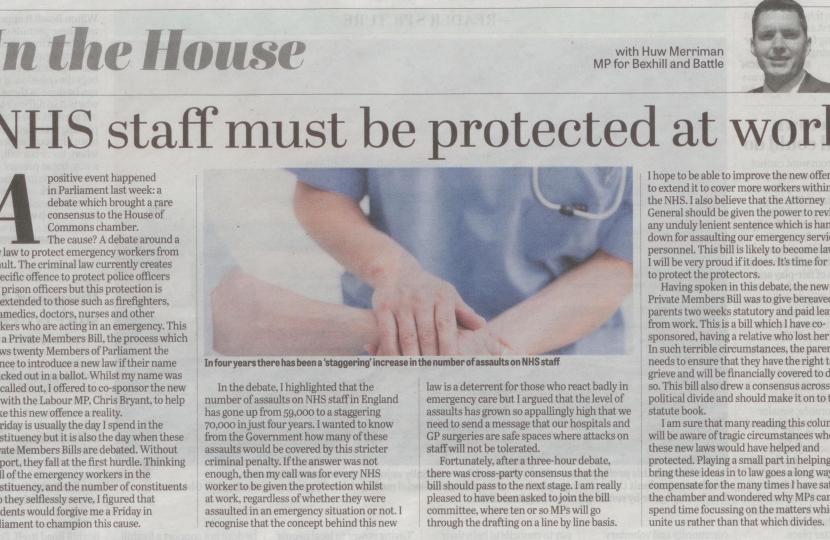
A positive event happened in Parliament last week: a debate which brought a rare consensus to the House of Commons chamber. The cause? A debate around a new law to protect emergency workers from assault. The criminal law currently creates a specific offence to protect police officers and prison officers but this protection is not extended to those such as firefighters, paramedics, doctors, nurses and other workers who are acting in an emergency. This was a Private Members Bill, the process which allows twenty Members of Parliament the chance to introduce a new law if their name is picked out in a ballot. Whilst my name was not called out, I offered to co-sponsor the new law with the Labour MP, Chris Bryant, to help make this new offence a reality.
Friday is usually the day I spend in the constituency but it is also the day when these Private Members Bills are debated. Without support, they fall at the first hurdle. Thinking of all of the emergency workers in the constituency, and the number of constituents who they selflessly serve, I figured that residents would forgive me a Friday in Parliament to champion this cause.
In the debate, I highlighted that the number of assaults on NHS staff in England has gone up from 59,000 to a staggering 70,000 in just four years. I wanted to know from the Government how many of these assaults would be covered by this stricter criminal penalty. If the answer was not enough, then my call was for every NHS worker to be given the protection whilst at work, regardless of whether they were assaulted in an emergency situation or not. I recognise that the concept behind this new law is a deterrent for those who react badly in emergency care but I argued that the level of assaults has grown so appallingly high that we need to send a message that our hospitals and GP surgeries are safe spaces where attacks on staff will not be tolerated.
Fortunately, after a three hour debate, there was cross-party consensus that the bill should pass to the next stage. I am really pleased to have been asked to join the bill committee, where ten or so MPs will go through the drafting on a line by line basis. I hope to be able to improve the new offence to extend it to cover more workers within the NHS. I also believe that the Attorney General should be given the power to review any unduly lenient sentence which is handed down for assaulting our emergency services personnel. This bill is likely to become law and I will be very proud if it does. It's time for us all to protect the protectors.
Having spoken in this debate, the new Private Members Bill was to give bereaved parents two weeks statutory and paid leave from work. This is a bill which I have co-sponsored, having a relative who lost her son. In such terrible circumstances, the parent needs to ensure that they have the right to grieve and will be financially covered to do so. This bill also drew a consensus across the political divide and should make it on to the statute book.
I am sure that many reading this column will be aware of tragic circumstances where these new laws would have helped and protected. Playing a small part in helping to bring these ideas in to law goes a long way to compensate for the many times I have sat in the chamber and wondered why MPs cannot spend time focusing on the matters which unite us rather than that which divides.



